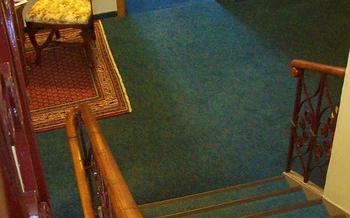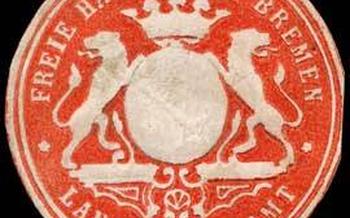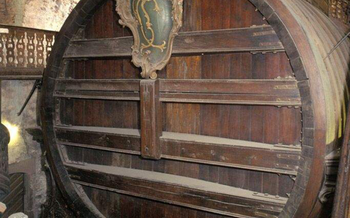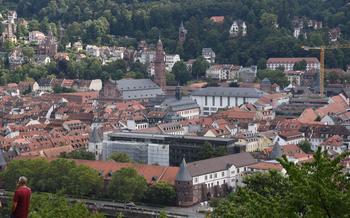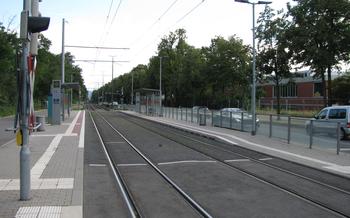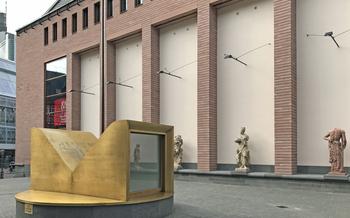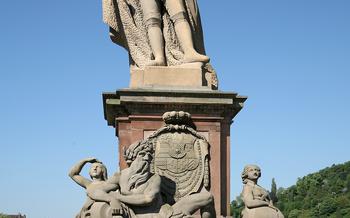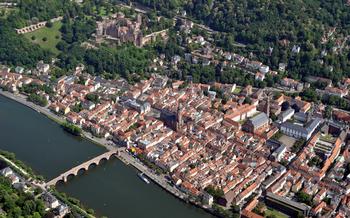
The President Friedrich Ebert Memorial Place
- The President Friedrich Ebert Memorial Place: An Overview
- Exploring the Life of Friedrich Ebert:
- The Building's Unique Architecture
- A Journey Through Ebert's Legacy
- Guided Tours and Educational Programs
- Reflecting on Ebert's Impact
- Engaging Exhibitions and Displays
- Unveiling Ebert's Personal Side
- Reflecting on the Past, Shaping the Future
- Accessibility and Amenities
- Location and Transportation
- Opening Hours and Admission Fees
- Insider Tip: Unveiling Hidden Gems
The President Friedrich Ebert Memorial Place: An Overview
In the heart of Heidelberg, nestled amidst historical landmarks, stands the President Friedrich Ebert Memorial Place, a testament to the life and legacy of one of Germany's most influential political figures. This beautifully preserved building, once the home of Friedrich Ebert, the first democratically elected President of Germany, offers visitors a poignant glimpse into the life of an extraordinary leader who navigated Germany through turbulent times. With its striking Neoclassical architecture and symbolic elements, the memorial serves as a reminder of Ebert's unwavering commitment to democracy and social justice. Today, the memorial invites visitors to explore Ebert's journey, delve into the complexities of the Weimar Republic, and reflect on the enduring impact of his presidency on German history.
Exploring the Life of Friedrich Ebert:
Friedrich Ebert, the first president of Germany, led an extraordinary life marked by political achievements and challenges. Born into a working-class family in Heidelberg in 1871, Ebert demonstrated a passion for social justice and workers' rights from an early age. He joined the Social Democratic Party (SPD) in 1889 and quickly rose through the ranks, becoming a prominent figure in the German labor movement.
As a charismatic orator and skilled negotiator, Ebert played a pivotal role in representing the interests of the working class in the Reichstag, the German parliament. His commitment to democracy and social progress earned him widespread respect and support among the German population.
In 1919, Ebert was elected as the first president of the Weimar Republic, Germany's first democratic government. His presidency was marked by immense challenges, including the aftermath of World War I, the rise of political extremism, and the Great Depression. Ebert's leadership and unwavering dedication to democratic principles during these tumultuous times were crucial in stabilizing the young republic.
Despite the complexities of his presidency, Ebert remained committed to improving the lives of ordinary Germans. He implemented social reforms, promoted workers' rights, and advocated for international cooperation. Ebert's legacy extends beyond his presidency; he is remembered as a pioneer of German democracy and a tireless advocate for social justice.
The Building's Unique Architecture
The President Friedrich Ebert Memorial Place stands out for its distinctive architectural style, reflecting the prevailing trends and influences of its time. Built in the early 20th century, the building showcases a blend of traditional and modern elements, embodying the spirit of the Weimar Republic.
Neoclassical influences are evident in the building's symmetrical facade, characterized by clean lines, geometric shapes, and a sense of order. The use of columns, pilasters, and pediments adds a touch of grandeur and formality, reminiscent of ancient Greek and Roman architecture.
Beyond its exterior, the interior of the memorial is equally impressive. The grand entrance hall leads visitors into a spacious and light-filled atrium, adorned with intricate moldings, decorative friezes, and polished marble floors. The walls are adorned with historical paintings and murals, depicting significant moments from Ebert's life and the Weimar Republic.
The memorial's most striking feature is the central staircase, which spirals upwards from the atrium. The staircase is supported by a series of slender columns, creating a sense of movement and elegance. The banisters are intricately carved, featuring motifs and symbols related to Ebert's presidency and the ideals of the Weimar Republic.
Overall, the President Friedrich Ebert Memorial Place is a testament to the architectural prowess and design sensibilities of its era. Its unique blend of traditional and modern elements, coupled with its historical significance, makes it a must-visit destination for anyone interested in German history, architecture, and the legacy of Friedrich Ebert.
A Journey Through Ebert's Legacy
The President Friedrich Ebert Memorial Place offers a comprehensive exploration of Ebert's life and work through its engaging exhibits. Visitors can delve into his political career through historical documents, photographs, and artifacts. Interactive displays and multimedia presentations bring Ebert's time to life, allowing visitors to witness key events that shaped German history. Thematic sections and educational resources provide deeper insights into specific aspects of Ebert's presidency, making the memorial a valuable resource for students, researchers, and history enthusiasts alike.
Guided Tours and Educational Programs
The President Friedrich Ebert Memorial Place offers a range of guided tours for individuals and groups, providing an immersive and informative experience. Knowledgeable guides lead visitors through the museum's exhibits, sharing insights into Ebert's life, the Weimar Republic, and the challenges of his presidency. Thematic tours allow visitors to explore specific aspects of Ebert's work, such as his role in the German Revolution or his efforts to establish democracy in Germany.
Educational programs are also available for students and researchers, offering a deeper understanding of Ebert's legacy and its significance in German history. These programs may include lectures, workshops, and seminars, allowing participants to engage with experts in the field and explore primary sources related to Ebert's life and times. By participating in these guided tours and educational programs, visitors can gain a deeper appreciation for Ebert's contributions and the impact of the Weimar Republic on Germany's political and social development.
Reflecting on Ebert's Impact
Friedrich Ebert's presidency was a tumultuous period marked by challenges and achievements that continue to shape historical debates and controversies. His role in establishing Germany's democracy and navigating the complexities of the Weimar Republic remains a subject of discussion among historians and political scientists.
Ebert's achievements included stabilizing the German government during a time of political and economic upheaval, and his commitment to democratic principles despite facing opposition from both the left and the right. However, his decision to use military force to suppress communist uprisings and his signing of the Treaty of Versailles, which many viewed as a betrayal of German interests, have been criticized.
Ebert's legacy is a complex one, with both positive and negative aspects. His contributions to German democracy are undeniable, but his actions during challenging times have been the subject of ongoing debate. Contemporary perspectives on Ebert's significance vary, with some viewing him as a flawed but important figure who laid the foundation for Germany's modern democracy, while others criticize his decisions and question his commitment to democratic ideals.
The memorial serves as a platform for exploring these debates and controversies, presenting a balanced view of Ebert's life and presidency. By examining the challenges he faced, the decisions he made, and the impact of his actions, visitors can gain a deeper understanding of this pivotal figure in German history.
Engaging Exhibitions and Displays
The President Friedrich Ebert Memorial Place captivates visitors with its array of interactive exhibits, multimedia presentations, and thematic displays that bring history to life. Through immersive experiences, visitors can delve into Ebert's work and the challenges he faced during his presidency. Touchscreen displays provide in-depth information, while audio-visual presentations transport visitors back in time, allowing them to witness key moments and decisions that shaped Germany's destiny. Thematic sections focus on specific aspects of Ebert's life, highlighting his role in the Weimar Republic and his impact on German democracy. These engaging displays not only educate but also inspire visitors to reflect on the past and its relevance to contemporary society.
Unveiling Ebert's Personal Side
Beyond his political achievements, the President Friedrich Ebert Memorial Place offers a glimpse into the personal life of Friedrich Ebert. Through anecdotes, stories, and artifacts, visitors gain insights into his character and relationships. Personal items, such as his favorite armchair, family photographs, and handwritten letters, reveal a more intimate side of Ebert, showcasing his human qualities and struggles. Visitors can explore the spaces where Ebert lived and worked, gaining a deeper understanding of his daily life and interactions with family and friends. These personal touches add a human dimension to the memorial, allowing visitors to connect with Ebert on a more personal level and appreciate the complexities of his life beyond his political role.
Reflecting on the Past, Shaping the Future
The President Friedrich Ebert Memorial Place serves as a platform for promoting discussions on democracy, social justice, and human rights. Through its exhibits and educational programs, the memorial encourages visitors to explore the complexities of German history and Ebert's role in shaping the country's democratic foundations.
The memorial's mission extends beyond preserving the past; it seeks to inspire visitors to engage with contemporary issues and contribute to shaping a better future. By shedding light on the challenges and triumphs of Ebert's presidency, the memorial encourages visitors to reflect on the importance of democracy, the rule of law, and the protection of human rights.
Visitors are invited to consider the lessons learned from the past and how they can be applied to present-day challenges. The memorial fosters a sense of civic responsibility and encourages visitors to become active participants in shaping a more just and equitable society.
Accessibility and Amenities
The President Friedrich Ebert Memorial Place is committed to providing an accessible and inclusive experience for all visitors. Wheelchair users and individuals with disabilities can easily navigate the memorial's spaces, thanks to ramps, elevators, and accessible restrooms. Guided tours are available in multiple languages to accommodate international visitors and ensure that everyone can learn about Ebert's life and legacy.
For the comfort and convenience of visitors, the memorial offers a range of amenities. Restrooms are conveniently located throughout the building, and a cloakroom is available for storing personal belongings. Visitors can also enjoy refreshments at the on-site café, which offers a selection of beverages and snacks.
To enhance the visitor experience, the memorial provides informative brochures, audio guides, and interactive touchscreens. These resources allow visitors to explore Ebert's life and the Weimar Republic in more depth and engage with the exhibits at their own pace.
Location and Transportation
The President Friedrich Ebert Memorial Place is conveniently located in the heart of Heidelberg, a city renowned for its picturesque beauty and rich history. Nestled amidst charming streets and historical landmarks, the memorial is easily accessible by foot or public transportation.
For those arriving by car, there are several parking facilities within walking distance, making it convenient for visitors to explore the memorial and the surrounding area. The memorial's central location allows visitors to seamlessly integrate their visit with other sightseeing attractions in Heidelberg.
The city's extensive public transportation network ensures easy access to the memorial from various parts of Heidelberg and the surrounding region. Visitors can take advantage of buses, trams, or the historic mountain railway to reach the memorial, enjoying the scenic views along the way.
Once in the area, visitors can immerse themselves in the vibrant atmosphere of Heidelberg's Old Town, explore the iconic Heidelberg Castle, or stroll along the banks of the Neckar River, relishing the city's unique blend of history and modernity.
Opening Hours and Admission Fees
The President Friedrich Ebert Memorial Place welcomes visitors with open arms during specific hours of operation. Plan your visit accordingly to delve into the life and legacy of Friedrich Ebert. The memorial is generally open from Tuesday to Sunday, allowing you to choose a convenient day to explore. Before embarking on your journey, check the official website for the most up-to-date information on opening hours and any special closures or events.
Admission fees are applicable for adults and students, enabling the memorial to maintain its exhibits and educational programs. However, concessions are available for students, seniors, and groups, making it accessible to individuals from all walks of life. To enhance your experience, consider booking your tickets in advance, especially for group visits. Advance booking ensures your entry and may also entitle you to group discounts, providing an economical way to explore the memorial.
Insider Tip: Unveiling Hidden Gems
Beyond the main exhibits and attractions, the President Friedrich Ebert Memorial Place holds hidden gems waiting to be discovered. Explore the lesser-known aspects of Ebert's life and presidency by delving into the archives and seeking out unique artifacts. Discover hidden corners of the memorial, such as the quiet reading room or the rooftop terrace offering panoramic views of Heidelberg. Engage with local experts and historians to gain deeper insights into the history and significance of the memorial. Participate in special events, workshops, or lectures to connect with fellow enthusiasts and learn from renowned scholars. Take the opportunity to explore Heidelberg like a local by venturing off the beaten path and uncovering the city's hidden treasures. Stroll along the picturesque Philosopher's Walk, visit the vibrant student district, or indulge in local delicacies at traditional restaurants. Embrace the vibrant atmosphere and immerse yourself in the rich cultural heritage of this charming city.
